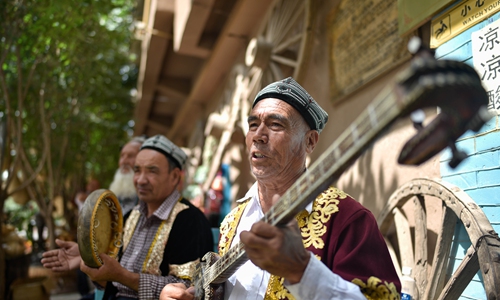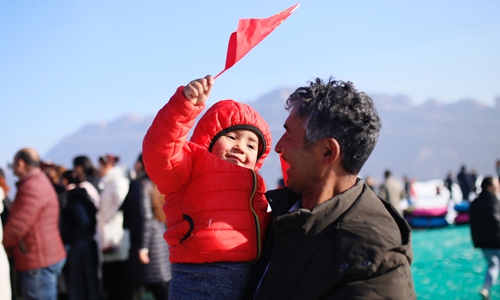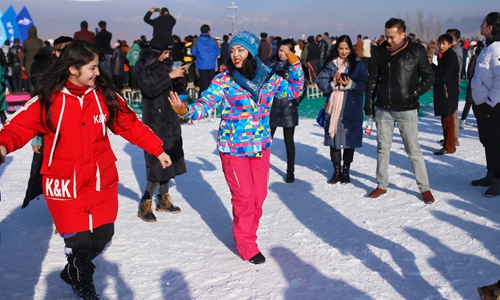HOME >> CHINA
World Uyghur Congress plays key role trying to split China
By Zheng Chen, Zhang Han and Liu Xin Source:Global Times Published: 2019/12/16 0:48:40

Artists play music in Kashi, northwest China's Xinjiang Uyghur Autonomous Region, on June 12, 2019. Photo: Xinhua
The World Uyghur Congress (WUC), an organization that is reportedly found to be linked to terrorist groups and receives money from Western political organizations, has long played an important role in smearing China's policies in Xinjiang Uyghur Autonomous Region and cementing Western media stereotypes of China.Some Western media and politicians, together with the WUC, have hyped and smeared China's policies in Xinjiang but remain silent about information released by the Chinese government or its media.
The WUC is headquartered in a low-rise building in Adolf-Kolping-Strasse near the railway station and commercial district of Munich in Germany.
The building, with an unnoticeable exterior, has become the heart of separatists from China's Xinjiang and the mastermind behind many separatist activists in Xinjiang.
WUC's core aim to split Xinjiang from China has never changed, Weinsheimer, a German scholar on China's ethnic groups, told the Global Times.
During an interview with the Global Times in 2009, members of the WUC had expressed their purposes of separating Xinjiang. But different from its previous image associated with violence, the organization has been using disguises more.

Photo: Shan Jie/GT
More disguises
Weinsheimer noted that Dolkun Isa, head of the WUC, now looks more "gentle" when facing the media and tries to curry sympathy from the audience by repeating his "miserable stories."
But no matter how many disguises Dolkun and WUC members use, their true intentions have been unveiled. In 2017, Dolkun and WUC members reportedly held a "strategic seminar" in Berlin, planning to consolidate the overseas "East Turkistan" terrorist to establish armed forces.
According to media reports, in March 2019, Rebiya Kadeer, the former head of the WUC, released an audio clip online, which revealed that the "East Turkistan Education and Solidarity Association" colluded with the "East Turkistan Islamic Movement" in sending jihadists to Syria.
The WUC was also found to work with the "East Turkistan Education and Solidarity Association" in transferring terrorists from Xinjiang to the Netherlands and Turkey, and helped Xinjiang terrorists in Malaysia and Thailand attend jihad in Syria or other places in the Middle East via Turkey.
Weinsheimer said that the WUC is stepping up cooperation with anti-China organizations in Germany and other countries, including the Society for Threatened Peoples. The organization invited Rebiya and Dolkun to give speeches many times on the alleged oppression of Uyghurs in China.
Experts from the Mercator Institute for China Studies, the largest institute on China studies in Europe, often echo the WUC view. Some international organizations including Human Rights Watch also help with WUC publicity. For example, when receiving media interviews, Wenzel Michalski, the German director of Human Rights Watch, echoed WUC's view recently in discussing alleged mass surveillance in Xinjiang.
The WUC also colludes with separatists from China's Tibet Autonomous Region and Hong Kong secessionist groups. On October 2, one day after the 70th anniversary of the founding of the People's Republic of China, several hundred separatists from Xinjiang, Tibet and Hong Kong gathered in Brussels, where the headquarters of the European Commission is located.
Together with some Western media, the WUC spreads fake news on China's Xinjiang. For example, it provided distorted information about the vocational education and training centers to some Western media.
The WUC also works with some Western politicians to pressure China. On June 4, US House Speaker Nancy Pelosi and Carl Gershman, head of the National Endowment for Democracy (NED), presented a democracy award to Dolkun.
Randall Schriver, the assistant secretary of defense for Indo-Pacific security affairs and James Patrick McGovern, a member of the US House of Representatives, attended a two-day conference in Washington in June, titled "Confronting Atrocities in China: The Global Response to the Uyghur Crisis."
In a previous interview with the Global Times, Dolkun said that the WUC funding came from "the people."
But in fact, the main financial supporter of WUC is the NED and some European foundations also provide financial support to WUC.
NED divides its programs on China into Chinese mainland, Hong Kong, Tibet and Xinjiang. It refers to Xinjiang as "Xinjiang/East Turkestan" on its website.

A soldier with the PLA's Xinjiang Military Command jumps through fiery hoops during training in -10 C weather in Shihezi, Northwest China's Xinjiang Uyghur Autonomous Region on Tuesday. Photo: VCG
Not about human rightsAccording to a white paper released by the State Council Information Office in July, "Historical Matters Concerning Xinjiang," never in Chinese history has Xinjiang been referred to as "East Turkistan," and there has never been any state known as "East Turkistan." Their advocacy for the so-called East Turkistan has become a political tool and program for separatists and anti-China forces to split China.
Frederick William Engdahl, an American writer and conspiracy theorist based in Germany, wrote an article in July 11, 2009 headlined "Washington is playing a deeper game with China" that "the reasons for Washington's intervention into Xinjiang affairs seems to have little to do with concerns over alleged human rights abuses by Beijing authorities against Uyghur people."
"It seems rather to have very much to do with the strategic geopolitical location of Xinjiang on the Eurasian landmass and its strategic importance for China's future economic and energy cooperation with Russia, Kazakhstan and other Central Asia states of the Shanghai Cooperation Organization," he wrote.
The Grayzone editor Max Blumenthal wrote in a report in August 2018 that Washington wants to pressure China with a US push for conflict with China. He talked with WUC chairman Omer Kanat, who took credit for furnishing many of the reports about alleged internment camps in the Western media.
Max Blumenthal noted in the report that Kanat told him over "1 million people" were in the camps in Xinjiang and then Kanat said the number of 1 million was offered by some Western media. Kanat also said that WUC offered more information on the training centers in Xinjiang to the US government and Western media.
In an interview with Süddeutsche Zeitung, Dolkun said that they aimed to impose more pressure on China and push Western companies to withdraw from Xinjiang.
The carmaker Volkswagen said in a statement in November that its 2012 decision to open the Urumqi facility in Xinjiang was "based purely on economics."
VW said it expects "further economic growth in the region over the coming years."
VW addressed working conditions at the Urumqi facility, which is operated by a joint venture with the Chinese company SAIC, noting, "We do not assume any of our employees are forced laborers."
The WUC drew the attention from German media after riots in Urumqi in 2009 and it now has a clear mark on the Google map.
Global Times reporters have interviewed some members of the WUC including Dolkun, who was the then secretary-general of the organization. The interview venue was changed from the WUC office to a cafe. WUC members previously agreed to let the reporter take photos of the building. But they later called the police and claimed the reporter was a suspected "spy."
After arguing with police officers for three hours and requesting to meet with the Chinese ambassador to Germany, the Global Times reporter was released.
Dolkun was selected as the head of WUC in a meeting in November 2017. His predecessor was Rebiya, who was the head of WUC from 2006.
The spokesperson for WUC told the media in 2017 that the meeting was historic for the organization as it had a new leading group to deal with new changes in the international order.

Photo: Shan Jie/GT
Hotbed for separatists
The organization planned to delegate more power to its lower branches all over the world and strengthen cooperation with international organizations and personnel.
Munich is believed by some people to be the "political center" for "Uyghurs-in-exile" and it is one of the settlement places for overseas Uyghurs. During the Cold War, the US set Radio Liberty targeting the former Soviet Union in Munich and it had a Uyghur program. There are about 700 Uyghurs living in Munich and the number living in Germany is about 1,500.
The Global Times learned from the Federal Office for Migration and Refugees that 125 Uyghurs came to Germany seeking asylum by the end of September, 68 in 2018 and 31 in 2017. Most of these Uyghurs did not come from China but Islamic countries.
According to information released by the media, Dolkun is from Aksu Prefecture. He took part in political activities when he was a student and was kicked out. Later he moved to Beijing and opened a Uyghur restaurant.
Dolkun fled to Turkey in 1994 and moved to Germany in 1996.
During his stay in Germany, he took part in establishing the "World Uyghur Youth Congress." In April 2004, the "World Uyghur Youth Congress" and the East Turkistan National Congress jointly started WUC.
The "World Uyghur Youth Congress" was identified as one of the "East Turkistan" terrorist groups by China's authority.
On its website, the WUC introduced the organization as "the umbrella organization representing many different Uyghur groups in 18 countries" including the US, Canada, Turkey, Australia and Japan.
WUC often holds rallies in Munich. The organization parked a car 120 meters from China's General Consulate in Munich with a banner calling for Uyghur freedom, human rights and democracy.
The move was described by German media as "a small provocation."
Dolkun, 52, has been arrested multiple times - in Frankfurt, Germany in 1999, in Seoul, South Korea in 2009 and in Rome, Italy in 2017.
In 2003, the China Ministry of Public Security identified him as a key member of the terrorist group the "East Turkistan Liberation Organization." Dolkun became a German citizen in 2006 and Germany offered him help when he was stuck in South Korea in 2009. The German government opposed the Chinese government's request to extradite Dolkun.
Posted in: SOCIETY